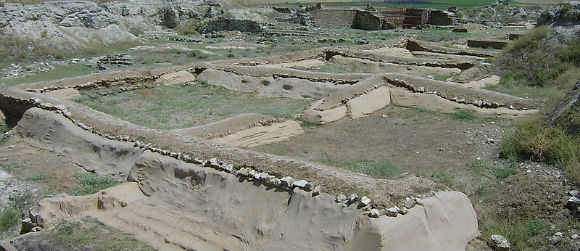Gordium, the capital of what may have been Meshech, is an archeological site just west of Polatli and near the Sakarya River. Among the ruins Is a Phrygian palace in which may be seen the earliest known geometrical patterns in mosaic. A great tumulus there may be the tomb of King Midas.
Many of the sites in Asia Minor mentioned in the Old Testament are in the eastern or south central part. The writers of the Old Testament naturally had the most contacts with people from the areas closest to them. But often the references were vague, and archeol-ogists today still have difficulty trying to pinpoint places such as Gomer and Tarshish, to say nothing of Ararat.
Meshech Gordium; Some of the non-geographical references of the Bible still echo in the lives of the people today. If a village does not own or have the use of a combine the people heap their grain on a windy threshing-floor to winnow it as in the story of Ruth and Boaz. Abraham’s sacrifice of a ram instead of his son is commemorated yearly by Muslims in the Festival of Sacrifice; Muslims believe that the son saved thus was Ishmael, not Isaac. Crops of olives, figs, and grapes are important in the economy of the area, and Jotham’s fable (Judges 9:7-15) of the trees that once upon a time decided to anoint a king and could only succeed in persuading the bramble to take the responsibility is a lesson even for people outside the Near East. And, the sense of responsibility to the stranger to take him into one’s home is a strong tradition particularly in rural Anatolia where the invitation may be unsophisticated but is always gracious and genuine.
With the New Testament many more of the places are well-known than those of the Old Testament and many still show evidences of first and second century Christianity. Also many more written records in known languages exist the closer we come to our own time. Almost all of the sites are in western Turkey where the Greek and Roman influence was strong. Perhaps it was because of the Hellenized Jewish communities and their ties with Europe that Christianity became first a predominantly Western religion. Without question it was also because of the force of Paul’s zeal and intellect and his unflinching spirit in proclaiming the Christian message. But one must remember that the New Testament was written in Greek describing the expansion of the church through Greek-speaking areas. There were similar important expansions through Syriac and other areas that it does not record.
Meshech Gordium,
